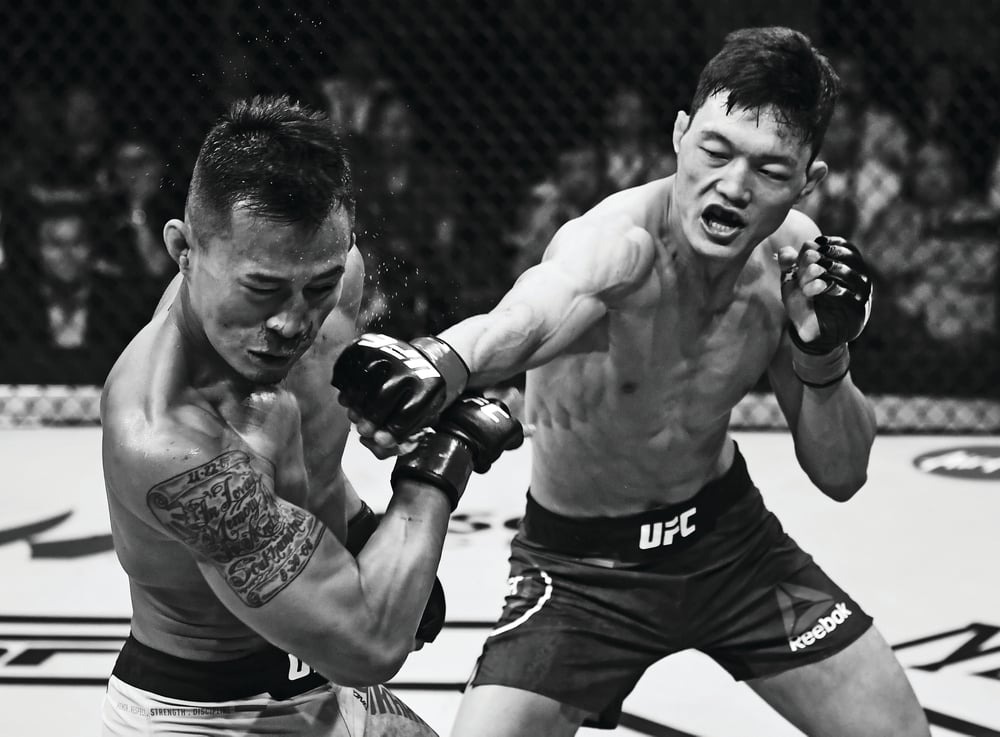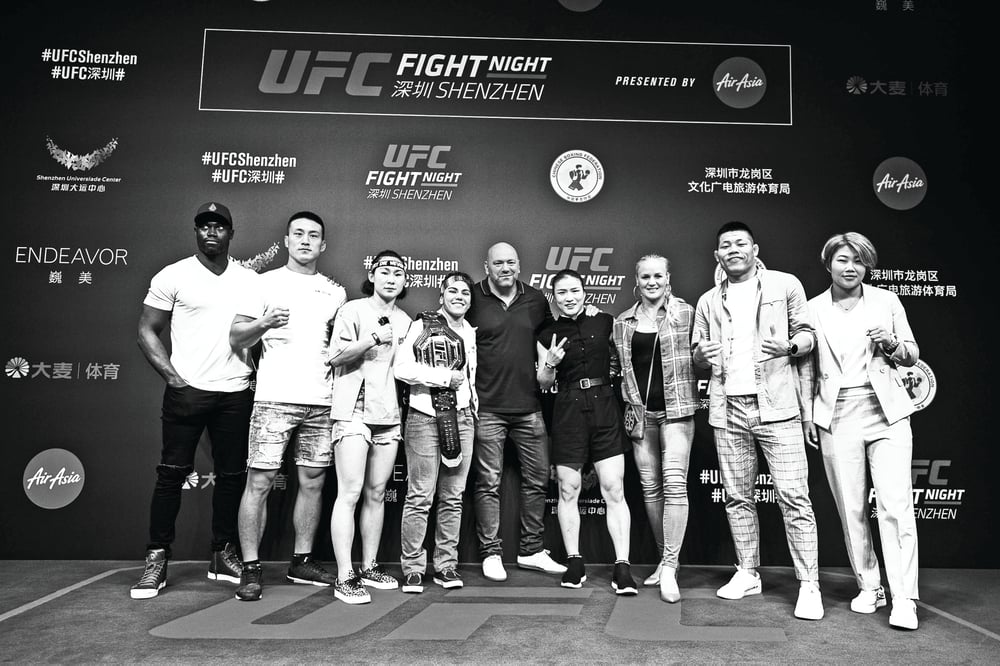
Issue 186
December 2019
The UFC is making a serious play to expand into China and now that Zhang Weili has become the country's first UFC champion, the chances for success have never been better
Long before Zhang Weili became the first Chinese citizen to claim a UFC golden bauble, deep-set plans were being made from the fight league's headquarters in Las Vegas to conquer China in a journey to the East. Surely it should not have been difficult, given the culture of martial arts in that country, the history of discipline and belief in sports, the vast market in numbers of people alone – 1.4 billion people in that country, after all – and indeed, a fast-growing and expanding economy?
In spite of internet strictures still in place by the government of the People’s Republic of China, surely it was time for the rise of the east in mixed martial arts? It may appear simple, but developing MMA in China remains a far more complex process, a more nuanced market than it appears on the surface, from the culture of the place, to the way this vast continent is governed.
The UFC has long wished to break through in China, a potentially huge market for the sport and of course, the area of the world which was traditionally the spiritual home of 'martial arts'.

The UFC had its first wish granted on the last day in August, 2019, in Shenzhen, when the female fighter Zhang Weili ripped the UFC women's strawweight title from Jessica Andrade of Brazil in just 42 seconds by TKO – knees and strikes – in a thrilling, dramatic main event. It was just the third fight event ever to be held in mainland China. But the portals had been burst open.
The script ran to perfection. “I felt so excited to win the title. It is like a fantastic dream coming true,“ said Zhang, a 5ft 4ins tall 30-year-old known as 'Magnum', undefeated on a 20-fight streak, a Sports University graduate who had amassed that winning streak after having lost her very first contest as a mixed martial artist. Zhang said all the right things: “I think the keys to my win were my calm mindset and the strategy defined by my coaches. All the strategies were practical, we predicted each important point, and they helped me seize every opportunity. I performed well last year in Beijing, and I won the belt this year in Shenzhen, since all my coaches are here with me, supporting me.“
The speech was perfect. It did not go unnoticed, moreover, that CCTV, the Chinese state television service which goes out to almost every home in the People's Republic, reported the success of its first champion in the UFC. It was huge for the fight league, for the fighter herself, and for the resonance of mixed martial arts in the country.

More than anything, it was a moment the UFC could leverage as a major breakthrough in China. Yet as the South China Morning Post – the most influential English language newspaper in Hong Kong – reported at the time, Ari Emanuel’s mixed martial arts entertainment company had been “banking on a new champion to double its profits in China“, having just negotiated a new media rights deal in the People's Republic of China. That current media rights deal, which was signed in 2016, permitted Chinese television the rights to broadcast UFC fights for five years at a reported cost of $50 million. But the success of a Chinese champion may have boosted the new deal by double, to $100 million, with market analysts predicting that it is likely to grow exponentially year on year.
The current owners of China’s UFC streaming rights are PPTV Sports, with tech streaming service giants Alibaba and Tencent also involved. Look at the bigger picture of sports rights in China, and the major American sports franchises and Premier League football from England, and Champions League football from Europe are the big players, all pushing to sell their live wares to China, which is being seen as the most profitable future market on the planet. The NBA is already worth $1.5 billion over these current five years (up from $500 million in its last deal) with PPTV paying $233 million a year for Premier League football. Huge sums, and the UFC sees its lucrative chances within the market.

UFC Senior Executive Vice-President, Lawrence Epstein is convinced that the UFC is a natural fit for Chinese audiences because of their knowledge and love for martial arts.
“There is a culture that has an affinity for martial arts in general,“ explained Epstein, a situation bolstered by the UFC opening a 93,000-square-foot Shanghai training centre this year which is already developing UFC fighters. The Shanghai PI achieved its first champion in less than nine months since the doors opened, the aim to have legitimate local champions in a major market. In there last five year, indeed, more women came into MMA in gyms in China through the success of Ronda Rousey, than any other fighters, sources have told Fighters Only.
The predominant style is Sanda – a set of rules which mixes striking and wrestling, though there is little ground fighting. It is on the ground where coaches from around the world are now being sought. Men's MMA continues to play 'catch up' in numbers and experience, but there is little doubt that MMA has developed massively over the last decade, but at present, it is a case of trial and error as the sport develops out of its embryonic stage.

UFC President, Dana White knows that the PI in Shanghai will only accelerate the prospects of any Chinese fighter with ability. “We know there is a ton of talent throughout Asia and we are identifying them and offering them all the training, nutrition, and physical therapy that UFC fighters are getting in the Performance Institute at our headquarters in Las Vegas, right there in China. This is another game changer for the sport, UFC, and potential athletes throughout Asia.“
The UFC has rivals, too, of course. ONE Championship have strong plans in the region. The plans being set by both ONE and the UFC are vastly different in philosophy, though the basis for success from both fight leagues is the same: the scouting and development and success of local heroes. It is a tried and trusted method. One Championship, though, insist on espousing traditional Asian attitudes in a country still steeped in conservatism. The crux is how the region can be introduced to modern sports entertainment, to the raw, visceral edge of the industry that has been so successful in making it edgy and different in the West. In other words, the transition from traditional martial arts to modern sports entertainment will be a crucial tipping point for the different presentation styles of the UFC and One Championship.
Right now, though, for the UFC, it is a case of 'build it and it will come' and there are plans for Zhang to defend her title in China early in 2020. Makes sense. While ONE Championship will build based on the existent culture of China, it would be no surprise to see the UFC take risks.
The UFC has always shown a Machiavellian ability to exert themselves in new markets with novel moves, given their ability to react fast to growing trends, listen to fans, create a new tune there. One of the slickest things going for them, which UFC president White discussed with me last year, was how mobile phone use will be one of the key methods of reaching fans of the sport in China as it grows there. Just as much as developing the fighters, developing there fanbase will be one of the most fascinating battles between the fight organizations.
ONE Championship's mission statement, according to its leadership, will be to have “one event every weekend in Mainland China within 5 to 10 years“ but based on traditional values. That policy could work, or it could backfire. Only time will tell. But behind any growth in MMA, gaining government support will be key.
It is a passage, moreover, that requires clever navigating. While the Chinese government is clearly in favor of fight leagues coming to China, aware that it can generate profitability, and a sizeable economic impact, they are still hardline on such things as tattoos, and indeed gangs.
That is why it could be a gamble at this stage to promote rivalries between the likes of Conor McGregor and Khabib Nurmagomedov, or the posturing of a Nate Diaz, given the clunky cultural mores these types of fighters could bring to bear on a landmass still struggling with the opening up of YouTube or many of the western-style social media channels that are now in everyday use in Europe and the United States. It may be many years before controversy sells fights in China.

But every fight league has an eye on the east. Bellator MMA, as much as the UFC and One Championship. “As we expand into Asia – we’re talking Japan, Korea and China,” explained Bellator President Scott Coker to Fighters Only, “we’ll break into those regions eventually. Right now we have our hands full with the expanding European series. We have our hands full with the US fights and we want to go to Latin America. But Japan is a big step for us in the Asian market,” explained Coker, having announced a Bellator event, in conjunction with RIZIN, on December 29 in Tokyo, headlined by Fedor Emelianenko against Quentin Rampage Jackson.
“We are super excited about that. You have no idea what it was like for me to be there personally,” he continued. “It was old school. Amazing.”
Thoughts of Japan, and those huge crowds that once graced the biggest arenas there, with many legendary names, makes one think of the potential again, if China mobilizes, as it is quite capable of doing over the next decade.
As mentioned, the world's leading coaches have been in demand in China, too, as the gyms and forward-thinking teams there look to develop the ways in which their best fighters can transition from stand-up fighting to ground fighting. Coaches like John Kavanagh, Conor McGregor's lead coach, have been in demand.
“China weren’t really part of the scene for a long time,” explained Kavanagh, “but now they’ve kind of burst onto the scene. There's no doubt about that. They’ve got their first champion. They have the resources. They have the passion. It’ll definitely be a strong house moving forward.”
Kavanagh has been over to China on missions several times.
“I was just coaching there and visiting every few months,” he recalled. “They’re very passionate about MMA. They don’t have major access to things like YouTube at the moment so they haven't been able to see all the new techniques and evolution of the sport. But they’ll catch up fast because they’ve got the numbers and resources.
“At the moment, the Chinese MMA style has a striking/kickboxing feel to it,” he added. “Jiu-jitsu is pretty much unknown. They have China Top Team, but they’re strength is the kickboxing side of things. The UFC have a PI out there, now as we know, and that will make a big difference. They’re (the UFC) investing in the market. Without a doubt, the UFC have done their maths on it and know it’s something to put effort in it.“
As Kavanagh also explained to me: “The UFC have sent 50 fighters to Greg Jackson's [gym]. Much like they did with developing Mexican fighters when they wanted to get into that market.”
Likewise, Marcus 'Conan' Silveira, the respected Brazilian coach, also a master in ground work, believes that it is in “mindset” that the Chinese fighters will make it in MMA at the very highest level.
“I’ve been to China. The last two times I was there, I saw some really good fighters. Seriously, I see a lot of potential there. The feeling I got back from them when I was in China, most of all, is that they have the right mindset. They do have the discipline, that’s part of the culture. They’re looking for information from outside China, too. That’s what amazes me more. They don’t have the idea that they will stay in China. There’s a lot of back and forth in sharing information and skills. They have the support now. It’s a matter of time until they’re amongst the very toughest of competitors.”
Having a champion, added Silveira, will make a huge impact.
“Now they have that, it changes. They have a champion. That means the door is open now. They’ve got potential and the drive, we’ve just got wait and see it. It will come, I have no doubt. They’re on the right path to get better. No one expected Zhang Weili to beat Jessica Andrade. Everyone thought it would be an easy fight for the Brazilian. I had a different opinion. I knew she had a combination of skills that Jessica didn’t know about. Just through her success alone, it shows that they’re on the right path.”
Back to White, UFC president, who knows all it will take is a tipping point for the sport to explode in the PRC. “As this sport continues to grow, and we get the right fanbase, it will get bigger and bigger. Wait until China really gets into it.” Well now the UFC has the seeds for growth.

The UFC, which has approaching 300 million fans worldwide and almost a third of them – over 93 million – from Asia, is well on the way to its own silk route to the East for a new, and lucrative market.
There is little doubt that the sport is growing both in resonance and rapidity in the region with more gyms and clubs sprouting up exponentially, month on month, with the UFC set for major growth in the next three to five years, with the Performance Institute underlined in bold in that process. All the UFC needs now is a men's champion, or a heavyweight of note, and they will be flying with a new UFC/Asian dynasty.
As Dana White says: “All you need is an incredible champion and a good fighter. Forget all the talking and the bullshit, you don’t need any of that. If you end up with a Chinese fighter who is legit and a great champion, that’s all you need.”
That time is coming and it promises to be a fascinating journey.
...









